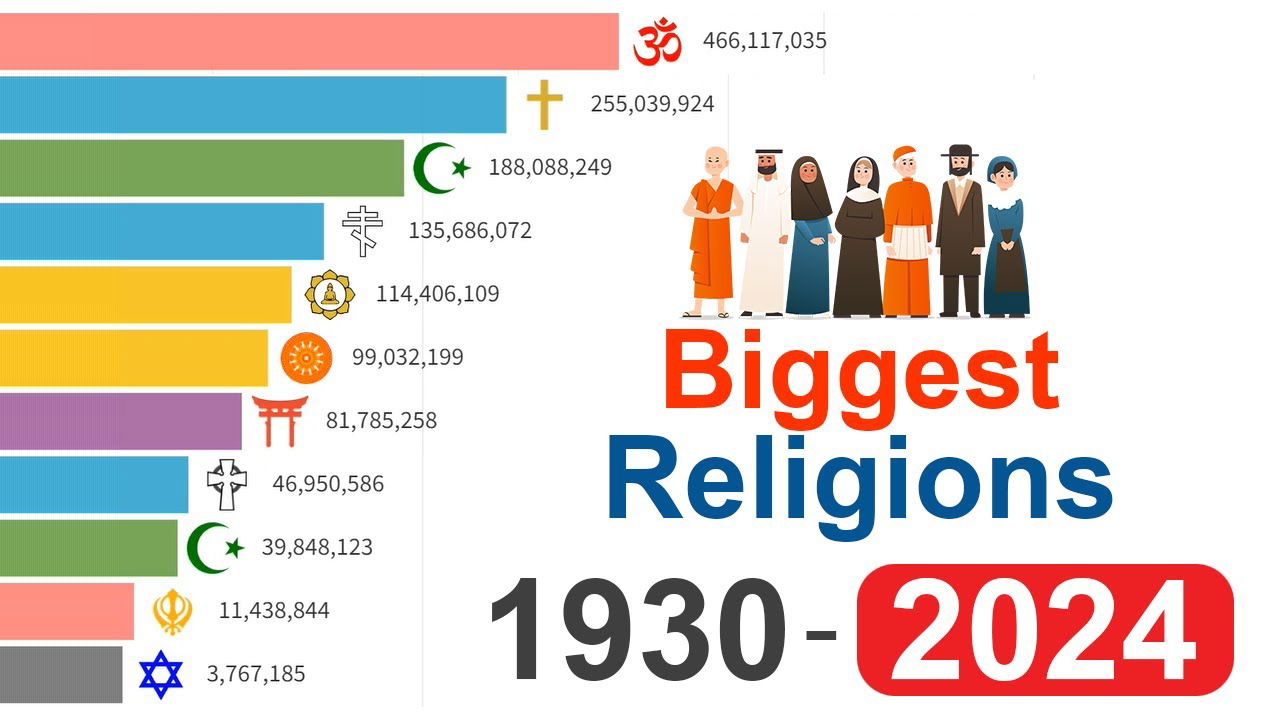The World’s Most Popular Religions
Religion occupies a crucial and definite role as the system of readings and the map of right and wrong in millions of people’s lives. As an aspect of societal practices, religion has left its imprint on the established beliefs, morals, and practices in societies all over the world. It is difficult to give an accurate figure for each religious group when people ask which is the best religion. In this article, we will study the answers to the world’s most popular religions and their followings.
The Most Followed Religions 2025
| Rank | Religion | Estimated Number of Followers | Description |
| 1 | Christianity | 2,200,000,000 | The biggest religion in the world, Christianity, is based on the teachings of Jesus Christ. |
| 2 | Islam | 1,800,000,000 | The second-largest religion in the world, Islam, is rooted in the revelations received by the Prophet Muhammad. |
| 3 | Hinduism | 1,100,000,000 | Often considered the first religion in the world, Hinduism encompasses diverse practices and philosophies. |
| 4 | Buddhism | 500,000,000 | Founded on the teachings of Siddhartha Gautama, Buddhism focuses on attaining enlightenment. |
| 5 | Sikhism | 25,000,000 | Sikhism emphasizes devotion to one God, equality, and community service |
| 6 | Judaism | 14,000,000 | One of the oldest monotheistic religions, Judaism is rooted in the covenantal relationship between God and the Hebrew people. |
Based on a meticulous analysis, the following seven religions command the largest following: According to the research done by different experts, the following seven religions have the largest representations in the world.
Biggest religion in the world 2025
1. Christianity:
With approximately 2. Christianity, with its followership of about 2 billion people, is accepted as the biggest religion in the world. Congruent with the teachings of Christ, this faith comprises various divisions, including Catholics, Protestants, and Orthodox. Each branch has its perception and practice of Christianity, which results from Jesus Christ.
2. Islam:
First of all, according to Islam, about 1. It is next to Christianity, adopted by approximately 8 billion people, ranking second among all the existing worldwide religions that are the biggest religion in the world. Being defined as the religion from concepts or revelations from Muhammad, Islam is one of the most diverse cultural and doctrinal. There are two major branches of Sunnic and Shia, which are also major parts of the Islamic religion; this is because the culture and flavors that exist in Muslims are different.
3. Hinduism:
However, having been one of the three largest religions globally, Hinduism has approximately one billion followers worldwide. 1 billion adherents. Attributed to be the oldest religion on the face of the earth, this faith has several practices and beliefs to preach to its followers. Both karma and dharma have an intersection with gods that, by one’s assumptions, are more than what one can imagine and led to the formation of the Hinduism religion.
4. Buddhism:
The second most followed religion in the world, with a population of half a billion Followers, is Buddhism. This religion promotes the spiritual journey of following the path shown by Siddhartha Gautama—the Buddha. The religion focuses on passing on pure merits through actions such as meditation and leading rather ethical lives; consequently, it has many fans worldwide.
5. Shinto:
Most observed in Japan only, Shinto has 3,104,000 Shoe (followers). This indigenous faith consists of a system of belief that has practices concerning the worship of gods, such as kami, which are associated with nature and the ancestors.
6. Sikhism:
Sikhism is the fifth largest religion on the list of the biggest religions in the world, with nearly 25 million followers worldwide. It started in the Punjab region of India in about the 15th century. Sikhism is a religion started in India by Guru Nanak, and its primary beliefs are monotheism, people’s equality, and justice.
7. Judaism:
Judaism, with 14 million adherents, is one of the oldest monotheistic religions. Rooted in the covenantal relationship between God and the Hebrew people, Judaism’s rich traditions and ethical teachings continue to impact its followers profoundly.
Studies Behind Exploration of Major Biggest Religions in the World
1. Christianity
Christianity’s unparalleled following makes it the largest religion in the world. This monotheistic faith centers on the belief in Jesus Christ as the Son of God and the savior of humanity. The Holy Bible, comprising the Old and New Testaments, serves as the sacred scripture. Christianity’s diversity is evident in its numerous denominations, each offering distinct interpretations of biblical teachings and worship practices.
Catholicism, the largest Christian denomination in terms of the most popular religion in the world, emphasizes the authority of the Pope and the sacramental system, particularly the Eucharist. Protestantism, which arose from the Reformation, includes various branches such as Lutheranism, Calvinism, and Anglicanism, each advocating different theological perspectives. Eastern Orthodoxy, with its rich liturgical traditions, maintains a strong emphasis on the continuity of apostolic faith.
2. Islam
As the second-largest religion in the world, Islam’s influence spans continents and cultures. Muslims believe in the prophethood of Muhammad and the divine revelations contained in the Quran. The Five Pillars of Islam – faith, prayer, fasting, almsgiving, and pilgrimage – provide a framework for a devout life.
Sunni Islam, representing the majority of Muslims, and Shia Islam, with a significant following, particularly in Iran and Iraq, differ primarily in their beliefs regarding the rightful succession of leadership after Muhammad’s death. Both sects, however, share core tenets that unite the global Muslim community.
3. Hinduism
Hinduism, often regarded as the first religion in the world, encompasses a vast array of beliefs and practices. Central to Hindu thought are the concepts of samsara (reincarnation), karma (action and consequence), and moksha (liberation from the cycle of rebirth). The religion venerates a multitude of deities, each symbolizing different facets of the divine.
Hindu worship practices, including rituals, festivals, and pilgrimages, reflect the religion’s rich cultural heritage. Texts such as the Vedas, Upanishads, and Bhagavad Gita offer profound spiritual and philosophical insights, guiding adherents in their quest for truth and enlightenment. People searching for answers related to which is the largest religion in the world find most of the answers in Hindu manuscripts.
4. Buddhism
Buddhism’s emphasis on mindfulness, compassion, and wisdom has garnered a significant global following and has made it known in some parts as the best religion in the world. Founded on the teachings of Siddhartha Gautama, Buddhism seeks to alleviate suffering through the Four Noble Truths and the Eightfold Path.
Meditation, ethical conduct, and the cultivation of wisdom are central to Buddhist practice. The religion’s rich tradition of monasticism and its philosophical teachings on impermanence, non-self, and interdependence continue to inspire practitioners worldwide, making it the most popular religion in the world.
5. Shinto
Shinto, the indigenous spirituality of Japan, reveres kami, spirits associated with natural elements and ancestors. Practices emphasize purification rituals, festivals, and the veneration of sacred sites. The religion’s deep connection to nature and its emphasis on harmony and community contribute to its enduring presence in Japanese culture. When people ask which is the best religion in the world, this is the religion that surely comes to one’s mind.
6. Sikhism
Sikhism’s principles of monotheism, equality, and social justice resonate with millions of adherents, which makes it the most followed religion in the world. The Guru Granth Sahib, the religion’s holy scripture, contains the teachings of Sikhism’s ten Gurus. Sikh practices include daily prayers, community service, and the wearing of the five Ks, symbols of faith and commitment.
7. Judaism
Judaism’s rich history and profound ethical teachings have shaped the beliefs and practices of its followers for millennia. The Torah, the religion’s central text, outlines the laws and narratives that guide Jewish life. Jewish practices, including Sabbath observance, dietary laws, and festivals, reflect a deep commitment to tradition and spirituality.
Conclusion
Spirituality in the numerous belief systems remains an influential factor in shaping a global culture. Among these, it is worthy to note that the Christian religions, Islam, Hinduism, Buddhism, Shinto, Sikhism, and Judaism, have many believers, many branches, different practices, and traditions. As with any study of these religions, it is significant to explore how other people seek to find their purpose and belonging and emphasize what they have in common, along with finding the biggest religion in the world.












Add Comment